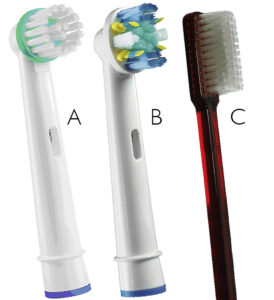We often hear from patients how oral hygiene can be challenging because the brackets, archwires, and appliances are an obstruction to brushing. In fact, one question we hear quite often from patients and their parents is which is better: a manual or electric toothbrush?
The team here at Forever Smiles wants to see every patient achieve success with their orthodontic treatment, and many of our patients clean their teeth perfectly well with a manual toothbrush. However, we would be remiss if we didn’t suggest some patients just do better with a little extra help. Let’s check out the facts.
Fact. Electric toothbrushes are cool. But more importantly some studies by the American Journal of Orthodontics & Dentofacial Orthopedics (AJO-DO) find there is significantly greater plaque removal with an electric brush over manual brushing. Perhaps the secret is in that electric toothbrushes seem to make it easier to manage brushing with automated timers and settings to control intensity. As with regular toothbrushes, electric toothbrushes work on metal, ceramic and lingual braces, but they do seem to have a definite advantage over manual brushes if they have a timer setting. Studies do suggest that manual toothbrush users tend to brush for shorter than the recommended 2 minutes because they simply lose track of time. This alone is a solid reason to invest in an egg timer if you use a manual brush.
Taking this a step further, in a study on the Efficacy of 3 toothbrush treatments on plaque removal in orthodontic patients assessed with digital plaque imaging: A randomized controlled trial researchers explored the use of two different electrically operated toothbrush heads - one a specialty oscillating-rotating orthodontic brush head (A) and one a regular electric head (B) along with a manual toothbrush (C). They concluded an electric toothbrush with either brush head A or B demonstrated significantly greater plaque removal over the manual toothbrush, and the orthodontic brush head (A) was in fact superior to the regular electric head.
“Removing plaque around brackets and archwires is challenging for patients which makes the results of this study particularly interesting,” said Dr. Razdolsky. “When you compare the regular electric toothbrush head to that of an orthodontic one you can see the ortho one is smaller and uniquely contoured to work around the fixed appliances and better reach the tooth surface. To put it simply, orthodontic brackets and wires create nooks and crevices that are hard to reach, and these brushes are often able to get to all of them,” he added.
What’s more, electric toothbrushes are designed to propel fluids between teeth, wires and around brackets, providing the most efficient and effective cleaning possible,” said Dr Razdolsky. “Most electric toothbrush models produce thousands of movements per minute. This is impossible to achieve with any manual toothbrush.”
Indeed, just take one look on the toothpaste aisle and you are affronted with a huge variety of toothbrushes, both manual and electric to choose from. Don’t even get us started on the different heads! But with this growth, researchers are studying more and different types of electric, sonic and manual toothbrush options on orthodontic patients to help us understand what may or may not work best - sometimes with mixed results.
That’s why Dr. Razdolsky reminds us that regardless of whether you invest in an electric toothbrush or stick with a traditional manual one, you can achieve good oral health and brushing habits if you follow the few simple tips we’ve included along in this issue of Bracket Chatter.
So, what do we know? Daily brushing and flossing help to prevent tooth decay, gum disease, and bad breath— whether it is done with a manual toothbrush or an electric one. There are quite a few ways using an electric toothbrush can help you get a little extra out of your oral hygiene routine, even though in many ways, brushing your teeth with an electric toothbrush is very similar to brushing with a manual one. Most importantly, we’ve learned that while maintaining good oral hygiene when you have braces may seem a little more difficult to achieve, looking to find the right toothbrush to help is not impossible. Dr. Razdolsky and the Forever Smiles team are here to help. Just ask us at your next appointment.





